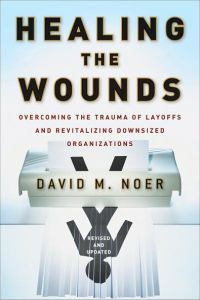Join getAbstract to access the summary!

Join getAbstract to access the summary!
David M. Noer
Healing the Wounds
Overcoming the Trauma of Layoffs and Revitalizing Downsized Organizations
Jossey-Bass, 2009
What's inside?
When layoffs are the norm, people must prepare independently for sequential jobs and organizations must rebuild.
Recommendation
Most books dealing with human resource issues are predictably detached and devoid of emotional consideration for employees. Leadership consultant David M. Noer’s refreshing study takes the opposite approach. He boldly issues a warning that the current global wave of downsizing has created a traumatic “layoff survivor sickness,” which employees can cure only by forging a new relationship with their employers. Although large corporations and top executives may have caused the 2008-2009 recession, lower-level employees shouldered much of the burden. That makes this report particularly timely. Looking ahead, Noer advocates a new employer-employee relationship that will empower employees and break their unhealthy codependency with their employers. This unsettling idea is a byproduct of the global, on-demand economy. getAbstract finds Noer’s book refreshingly insightful and clearly written, and recommends it to aware, forward-thinking employees, ex-employees, executives and human resource professionals.
Summary
About the Author
David M. Noer is an honorary senior fellow at the Center for Creative Leadership and professor emeritus of business leadership at Elon University. He consults on downsizing, coaching and leadership development. His books include Breaking Free.


















Comment on this summary